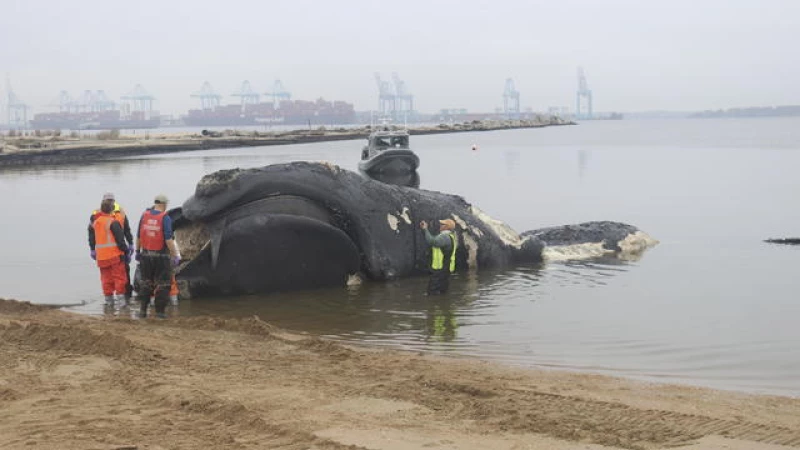Another Endangered North Atlantic Right Whale Killed in Ship Collision
An increasingly deadly year for the endangered North Atlantic right whale got worse this week when another member of the species was killed in a collision with a ship, federal authorities said Thursday.
The giant species of whale numbers less than 360 and is vulnerable to ship strikes and entanglement in fishing gear. The whales have suffered high mortality in recent years, and several have died already this year off Georgia and Massachusetts.
The most recent right whale to die was found floating 50 miles offshore east of Back Bay National Wildlife Refuge in Virginia Beach, Virginia, last Saturday, the National Oceanic and Atmospheric Administration said in a news release. The whale was a mother who gave birth to her sixth calf this season, the agency said.
Preliminary findings of a necropsy show "catastrophic injuries with a dislocation of the whale's spine" that "are consistent with blunt force trauma from a vessel strike prior to death," the agency said Thursday.
The right whale's population fell about 25% from 2010 to 2020. Numerous environmental groups have said the animal can't withstand such dramatic population loss.
"Human impacts continue to threaten the survival of this species," NOAA said in its statement.
"The Fate of the North Atlantic Right Whale Hangs in the Balance as Vessels Navigate the Seas"
Once abundant along the East Coast, the North Atlantic right whale population was decimated during the commercial whaling era. With slow reproduction rates and a dangerously low number of reproductive females, the survival of this majestic species is at a critical juncture.
According to NOAA, the recent death of a right whale calf marks the fourth documented fatality of 2024. The calf, separated from its mother, has not been seen in weeks and its chances of survival are slim.
In January, a young right whale washed up dead on a Martha's Vineyard beach. Scientists believe the whale became entangled in fishing gear originating from Maine, leading to its demise.
Tragedy struck again in February when a 1-year-old right whale was discovered dead in Savannah, Georgia, marking another significant loss for the species.
Environmental advocates are urging for stricter regulations on commercial fishing and shipping activities to protect the remaining North Atlantic right whales. Studies have shown that these whales are facing threats from ocean warming, which has caused disruptions in their food sources.
The changing distribution of food has forced the whales to venture into unprotected waters, increasing their vulnerability to collisions with vessels. As these creatures undertake their annual migration from calving areas in Georgia and Florida to feeding grounds in New England and Canada, their survival is increasingly jeopardized.
Environmental groups have resorted to legal action in an attempt to compel the federal government to implement a new vessel speed rule aimed at safeguarding the whales from further harm.
In Massachusetts, a new measure is being considered to implement speed limits on rapid ferries traveling to Cape Cod and the Islands with the aim of safeguarding whales. Despite opposition from ferry companies, who argue that this restriction would significantly decrease their service, they claim that their captains have never encountered a right whale during their voyages.
"The decision is clear: Vessels must either reduce speed or risk the extinction of the North Atlantic right whale," stated Sarah Sharp, an animal rescue veterinarian from the International Fund for Animal Welfare who participated in the necropsy. "How many more right whales must be lost before we see a change?"







